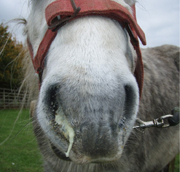Breakthrough in Strangles Vaccine Research
New research published today shows how scientists have moved a step closer to developing a vaccine to protect horses from Strangles.
World-leading scientists from the Animal Health Trust (AHT), the Swedish University of Agricultural Sciences, the Karolinska Institute, and Intervacc AB, have developed a new protein-based vaccine to protect horses from Strangles. Strangles is caused by a bacteria called Streptococcus equi, which causes horses to suffer from large pus-filled abscesses in their throat and neck. With an estimated 600 outbreaks of Strangles each year in the UK alone, the development of the new vaccine will have tremendous benefits to the health of horses around the world.
“We are delighted to have shown that our Strangvac vaccine protected over 80 % of horses from this dreadful disease,” said Prof. Jan-Ingmar Flock, CEO of Intervacc AB, the company that produced the vaccine. “Strangles is a scourge of the equine world and the development of Strangvac has the potential to prevent many thousands of horses from falling ill each year.”
Harnessing the power of the genome-era
“Strangvac is an extremely exciting vaccine” explains Dr. Andrew Waller, Head of Bacteriology at the AHT. “The vaccine was designed using information from sequencing the DNA of Streptococcus equi and highlights the potential that the genome-era heralds for improving the health of animals and people. Improving the health of horses is a core aim of the Animal Health Trust and we are proud to have helped make this vaccine a reality towards finally breaking the hold this disease currently has on our horses.”
“Transfer of the manufacturing process and production of commercial batches are underway towards the registration and launch of Strangvac,” continued Prof. Flock, “and we anticipate that Strangvac will be available for use during 2020.”
The work “Strangvac: a recombinant fusion protein vaccine that protects against strangles, caused by Streptococcus equi” is published in the journal Vaccine and can be viewed here












